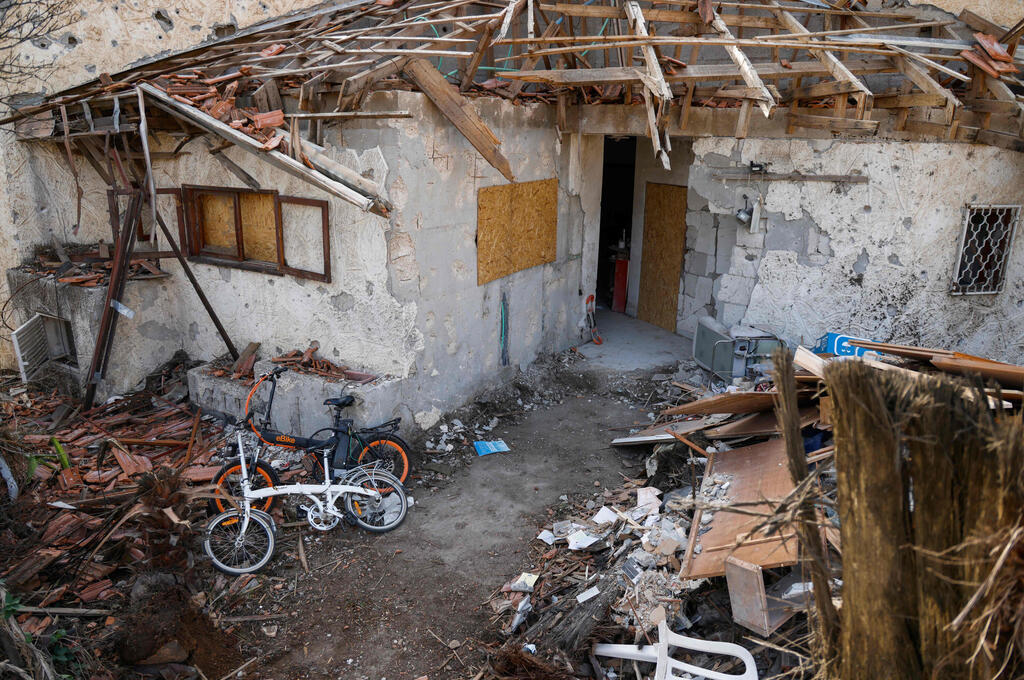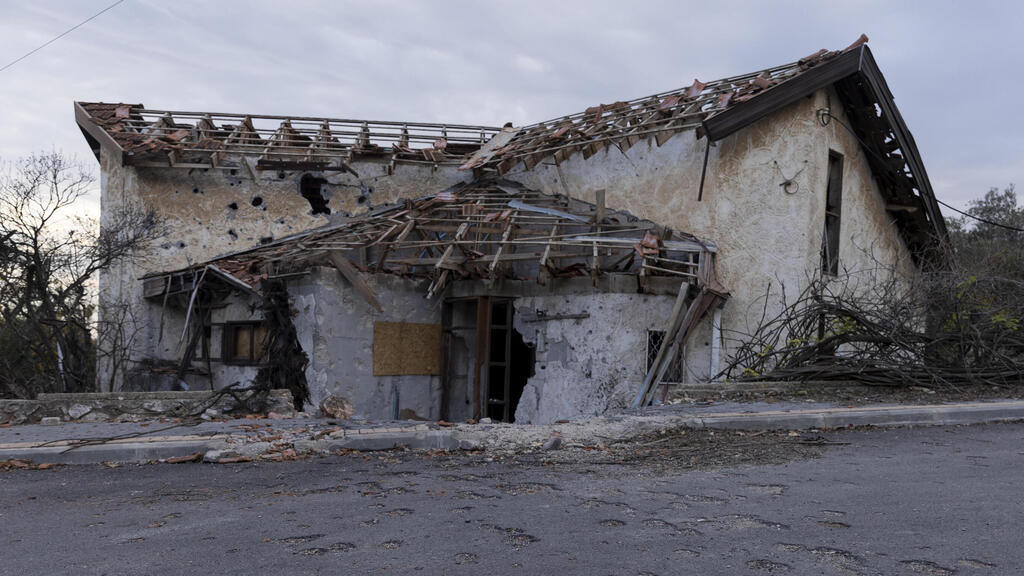Following the cease-fires with Hamas in Gaza and Hezbollah in the north, Israel swiftly launched its postwar reconstruction efforts. Thousands of civilian structures in war-affected areas require urgent rebuilding, but despite a general sense of optimism, the process is fraught with challenges.
Multiple projects are already in place, such as the Tekuma (Revival) Administration, which has a five-year mandate and an initial allocation of 19 billion shekels ($5.3 billion) to rebuild devastated communities. Still, as of January 2025, Israel's state budget, totaling approximately 607.4 billion shekels ($170.9 billion), has yet to be approved and doesn’t have a precise slice dedicated to rebuilding war-torn regions. The country is at an impasse because it can’t know if military expenditures will become a priority again, considering the frail cease-fire.
Temporary housing in Kibbutz Be'eri as reconstruction efforts begin
(Video: Tekuma Administration)
Despite the uncertainty, Israeli infrastructure companies have experienced a significant value surge. Danya Cebus’ market capitalization reached 3.71 billion shekels, an increase of 13.02% over the past year. Similarly, Shikun & Binui’s market capitalization of 6.78 billion shekels marks a 34.52% increase over the past year.
According to Natanel Haiman, head of the Economics Division at the Manufacturers Association of Israel, recent economic trends show signs of recovery. “Consumption is rising. Between September and November 2024, there was a 10.6% increase in industrial product purchases and a 4.6% rise in total credit card transactions. This reflects renewed consumer and business confidence.”
Similarly, Eliran, a community leader from Ma’alot, said that there is a lot to do, but that progress is being made. “The municipality is supporting the reconstruction of the damaged buildings, but it’s still taking time to see results on the ground,” he said. “Roads and damaged infrastructure have already been repaired, but it’s more complicated in the community. Many people have been financially impacted and still haven’t managed to recover. We have an economic aid fund through which we have helped several people, but it’s not enough.”
Unfortunately for Israel’s reconstruction plans, the postwar stability depends on a fragile ceasefire, which also impacts the economic revival. Dr. Roby Nathanson, CEO of the Macro Center for Political Economy, explains that the reconstruction process isn’t just rebuilding the destroyed physical structures but also economic revival. “Reconstruction cannot succeed without revitalizing the business sector. People will not return to places without employment or income opportunities. In my view, that is the greatest challenge,” he said.
2 View gallery


A destroyed home in Metula on Israel's northern border with Lebanon
(Photo: Jalaa Marey / AFP)
Chen Herzog, chief economist at BDO, emphasizes that while security stabilization offers a pathway for economic recovery, challenges remain. “2024 was a tough year economically, with a per capita growth decline of 1.5%, meaning Israelis became poorer in real terms,” Herzog explains. He adds that economic measures, including a hike in value-added tax from 17% to 18%, higher income taxes, and reduced welfare payments, are weighing on the Israeli public. “We need an effective budget allocation for reconstruction to ensure economic rebound. But as of now, Israel is still operating under last year’s budget framework.”
Nathanson also agrees with the urgency of the national budget for 2025. “The government must pass the budget by the end of March; otherwise, the government could fall. This budget primarily addresses defense and urgent needs but includes very little for recovery programs, economic growth, productivity or business reactivation,” he said.
However, even when Israel has a new budget for 2025 if the cease-fire collapses, the economy will take another severe hit, Haiman warns. “If war resumes, businesses will be thrown back into crisis. The key is maintaining a stable cease-fire to allow for sustainable economic recovery.”
“In 2024, Israel saw 65,000 businesses close, while only 35,000 new businesses were established. In normal years, we see about 50,000 openings to 40,000 closures. This is a major issue,” Nathanson added.
The north of Israel, which was heavily hit by Hezbollah missile attacks, remains the most economically devastated region. According to Nathanson, of the 150,000 businesses in the north, about 80,000 are in the Upper Galilee, the hardest-hit region. “For businesses in the north, this is a matter of survival. Around 50% of businesses in the restaurant and service industries had to close, and 25% will never reopen. Reconstruction cannot succeed without revitalizing the business sector.”
This economic instability is not just regional – it is reshaping national recovery efforts. As Nathanson highlights: “If schools don’t reopen, teachers don’t return. If businesses stay shut, families won’t come back. The entire system is interdependent.”
2 View gallery


Damaged home in Metula, located on the border with Lebanon in northern Israel
(Photo: Amir Levy/Getty Images)
Alongside the complexities of economic revival, Israel has to deal with its ongoing labor shortage, which existed even before the war and worsened significantly since October 7. The country’s previous reliance on Palestinian workers left an 80,000-worker shortfall, stalling reconstruction efforts nationwide.
While the government has attempted to fill the gap with foreign labor from Sri Lanka, India and other countries, Nathanson warns that “reinstating some level of Palestinian employment may be inevitable. This labor crisis is also fueling soaring housing prices – before the war, a young couple needed around 80 times their annual income to buy an apartment; now, that figure has climbed to 150-160 times.”
Herzog further highlights the strain on the real estate sector, noting that housing starts have dropped dramatically, with “only 20,000 to 30,000 units being built annually, while 60,000 new families enter the housing market each year – a gap that will continue to drive prices even higher.”
Eliran from Ma’alot confirmed the expert’s concerns as he believes “there is a labor shortage. There are structures like shelters that need thorough repairs but have not yet been taken care of due to a lack of manpower and resources.”
New building regulations have been implemented in affected areas to make things easier and faster and to handle the workforce shortage. Eliran from Ma’alot said they “have several community members who have recently built reinforced security rooms (mamads) with less bureaucracy. With the approval of the Home Front Command, the planning committee immediately granted building permits. I assume these have been approved by an engineer.”
Along with other measures that could facilitate the rebuilding and revival, Nathanson believes Israel has a very high interest rate (4.5%) and should consider lowering it. “If the interest rate is reduced, it could provide a significant boost to economic recovery, investment and business activity. Debt servicing will increase, but reducing interest rates now could provide a crucial economic stimulus, especially for construction and business recovery,” he said.
Get the Ynetnews app on your smartphone: Google Play: https://bit.ly/4eJ37pE | Apple App Store: https://bit.ly/3ZL7iNv
Similarly, Herzog believes that lowering interest rates could help, but for that to happen, “Israel needs confidence that inflation and the government deficit are under control. Right now, that’s not the case. The Bank of Israel cannot reduce interest rates because of uncertainty about the government budget and national debt targets. Israel’s risk premium needs to come down, and the rating agencies need to have confidence in Israel’s financial stability before we can expect lower interest rates.”
That said, “a continued cease-fire is already strengthening the shekel. A stronger shekel makes imported goods cheaper, which in turn helps lower inflation. If this trend continues, we might see the Bank of Israel considering interest rate reductions in 2025’s second half,” he added.
Israel’s strong macroeconomic sectors, such as high-tech, military industries, energy and communications, have “remained stable, and the stock exchange even rose during the war, and the shekel, while weakened, has been recovering,” Nathanson added.
As Israel’s reconstruction process begins, its conditions remain uncertain. From an ice-thin ceasefire to an unclear national budget and a lack of workforce, Israel faces a crossroads that could redefine the country for decades to come, for the better or the worse. As Haiman said: “While the current conditions foster optimism and growth, the Israeli business community must be prepared to navigate uncertainty regardless of the circumstances.”
This article is written by Nathan Klabin and reprinted with permission of The Media Line



